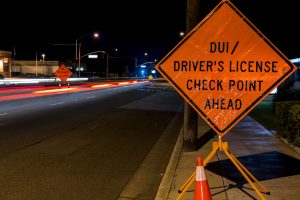Pennsylvania DUI Roadblock Laws
Question – What is a DUI checkpoint? Are Pennsylvania DUI roadblocks legal? Are they constitutional?
Your Short Answer – In Pennsylvania the random stop of a vehicle is unconstitutional but federal and Pennsylvania law do permit them in certain situations.
Here is your long answer
What is a DUI Roadblock aka a DUI checkpoint?

Pennsylvania defines a roadblock as a well-marked stationary point supervised by police where officers make a brief “without suspicion” stop to check for a driver’s intoxication using a pre-determined objective standard. Pennsylvania’s definition of a constitutionally accepted roadblock further requires that it be advertised in advance and that it be located on a road or highway where drunk driving arrests have been made based in the past.
What makes a PA DUI roadblock legal?
While on the surface roadblocks appear to violate the Fourth Amendment to the United States Constitution and Article 1, Section 8 of the Pennsylvania Constitution, the United States Supreme Court and the Pennsylvania Supreme Courts have found these law enforcement devices permissible provided that the police satisfy certain requirements. In Pennsylvania, if the Commonwealth wants to prosecute someone following an arrest at a Pennsylvania DUI roadblock it bears the burden of establishing the constitutionality of that roadblock. The prosecution must establish that the roadblock was set up based on a systematic, non-discriminatory, and non-arbitrary manner. For more information on DUI, check out my free books
What factors will determine the legality of Pennsylvania DUI roadblocks and checkpoints?
Almost every case involving the constitutionality of a roadblock will cite the “Tarbert/Blouse” standard. This standard comes from two Pennsylvania Supreme Court Decisions which balance an individual’s constitutional rights under the Fourth Amendment and Article 1, Section 8 of the Pennsylvania Constitution against Pennsylvania’s compelling interest of public safety (protecting people from drunk drivers.) The Court in both of these cases found that while roadblocks intruded upon a person’s constitutional rights, it is an acceptable level of intrusion given the state’s interest in protecting the public. Based on these Supreme Court decisions a Pennsylvania Court will find a DUI roadblock or any checkpoint constitutional only if it meets the following requirements:
- The vehicle stop must be brief and it cannot include a search of the vehicle or its occupants
- Police must give advance notice (signs, notices through the media, ie: newspaper, advertisements)
- Police administration must make the decision to schedule the roadblock and police officers cannot simply schedule it on their own
- The location and time of the roadblock must be based on a history of drunk driving incidents and arrests in that location
- The “stop criteria” must be based on an objective standard created by police administration and not individual patrol officers
Important Information for Drivers About Pennsylvania DUI Roadblocks – You can avoid them!
A driver is legally permitted to avoid a roadblock and police can’t stop a car simply based on the belief that a driver is avoiding them. In Pennsylvania police can only stop a vehicle which attempts to avoid a roadblock if the police officer believes that the driver is purposely avoiding them and the officer has a reasonable suspicion that the motorist is either in violation of Pennsylvania’s vehicle code or the motorist is committing a crime due to the car’s sudden or abrupt change of direction.
Roadblocks create a variety of pre-trial issues for your attorney to argue in your case. If your Philadelphia DUI defense attorney doesn’t attack these issues and focus argument on them, he/she simply doesn’t understand Pennsylvania DUI roadblock laws. Our team of Philadelphia, Pennsylvania DUI defense attorneys fully understand these laws. Contact them for a free consultation and explanation of your rights and how to protect them.



